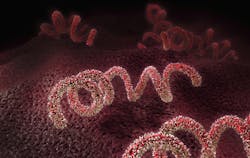Recent study findings found a way to streamline syphilis treatment, hopefully encouraging more patients to seek care. The findings are summarized in a National Institutes of Health (NIH) press release.
Benzathine penicillin G (BPG) is an antibiotic commonly used to treat syphilis, but it is facing a shortage. Additionally, not all patients complete treatment. BPG is customarily administered in three separate doses, requiring patients to schedule follow-ups with their provider.
The study investigated the effectiveness of one dose of BPG vs. three in participants with early syphilis. Findings showed similar success rates in both groups (76% vs. 70%, respectively). It is important to note that most of the study participants (97%) were men.
Carolyn Deal, Ph.D., chief of the enteric and sexually transmitted infections branch of NIH’s National Institute of Allergy and Infectious Diseases (NIAID) said in a press release, “Benzathine penicillin G is highly effective against syphilis, but the three-dose regimen can be burdensome and deter people from attending follow-up visits with their healthcare providers. The new findings offer welcome evidence for potentially simplifying treatment with an equally effective one-dose regimen, particularly while syphilis rates remain alarmingly high.”

